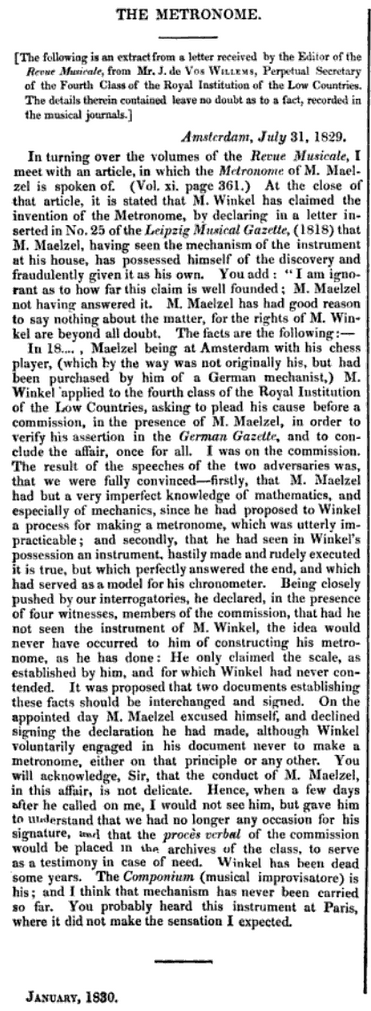Welcome to one of the most active flamenco sites on the Internet. Guests can read most posts but if you want to participate click here to register.
This site is dedicated to the memory of Paco de Lucía, Ron Mitchell, Guy Williams, Linda Elvira, Philip John Lee, Craig Eros, Ben Woods, David Serva and Tom Blackshear who went ahead of us.
We receive 12,200 visitors a month from 200 countries and 1.7 million page impressions a year. To advertise on this site please contact us.
|

|
|
Beethoven metronome broken?
|
You are logged in as Guest
|
|
Users viewing this topic: none
|
|
Login  | |
|

   
Ricardo
Posts: 14822
Joined: Dec. 14 2004
From: Washington DC

|
 Beethoven metronome broken? Beethoven metronome broken?
|
|
|
So I had no idea that there is this crazy argument about metronome markings in the 19th century. This relates to flamenco I guess, and in particular could have relevance if proven true for the Ocon score Soledad that is marked at 184 bpm (close to buleria).
In case people are confused at what his guy is saying (I was), he believes, based on the fact modern pianists struggle with certain pieces outside of their tempo ability, that back in the 1800s the tempo indications such as quarter note equals 120bpm, that what that refers to was TWO swings of a pendulum metronome each = 120, so that actual feeling of the quarter note is half that, or 60 bpm. In other words, most or ALL the classical music from the birth of the metronome to audio recording technology, was performed at HALF the speed we think of it today. He argues that most of those pieces are played too fast, but IN THE MIDDLE of the indicated speed and its subdivisions, due to the “impossible technique” required to execute the real speed. (Something like quarter=120bpm I described, people play in the 90s, however, he believes they are playing too fast, it should be 60bpm). I am not so sure I buy the argument, but find it interesting people are so concerned about it:
https://youtu.be/vBFmJVG0wak
This guy has tons of videos and examples on the subject, but none of the others really convince me, and here we have written evidence he presents, that might have interpretation issues (16ths and 32nds are in the score with ta’s under).
_____________________________
CD's and transcriptions available here:
www.ricardomarlow.com
|
|
|
|
REPORT THIS POST AS INAPPROPRIATE |
Date Dec. 2 2022 14:09:06
 |
|

   
Ricardo
Posts: 14822
Joined: Dec. 14 2004
From: Washington DC

|
 RE: Beethoven metronome broken? (in reply to kitarist) RE: Beethoven metronome broken? (in reply to kitarist)
|
|
|
quote:
Regarding 2, the actual metronome-produced tempos were correct for him using his metronome reading the bottom number; he just did not notice the actual tempo coming out of the metronome was 12 bpm slower than the apparent mark he was reading. So from his point of view there wasn't anything to correct - the tempos produced by the metronome were the exact ones he wanted..
First of all, I need the word NOT in my sentence, why did he NOT go back and fix the previous incorrect indications. But I think you understood the issue. The problem is, we need to see the exact timeline with highlighted correct and erroneous tempo markings laid out to decide if there is a mistake like the one put forward. The evidence was the “either or”, TWO tempos given on the sheet of music of the 9th symphony. Point being, if the symphonies are written in temporal sequence, whoever realized there was an issue with reading the thing at the 9th, should have gone back and fixed the 5th by adding the same 12bpm margin of error. This did not happen, it is believed the 5th is too fast, but what we DO know is that there are Beethoven works that in fact do have the correct tempo marking based on modern opinion. So hopefully you see the problem I have with not seeing the timeline first before making the claim that the reading error he noticed and “fixed”.
Otherwise we have to believe that known tempo markings are randomly distributed as under or over readings and we are back at applying our basic intuition about what is the intended tempo.
https://youtu.be/ue61NL-4xu8
Vs.
https://youtu.be/tX22Q2rTqIw
Opinions vary  
_____________________________
CD's and transcriptions available here:
www.ricardomarlow.com
|
|
|
|
REPORT THIS POST AS INAPPROPRIATE |
Date Dec. 3 2022 18:37:01
 |
|
 New Messages New Messages |
 No New Messages No New Messages |
 Hot Topic w/ New Messages Hot Topic w/ New Messages |
 Hot Topic w/o New Messages Hot Topic w/o New Messages |
 Locked w/ New Messages Locked w/ New Messages |
 Locked w/o New Messages Locked w/o New Messages |
|
 Post New Thread
Post New Thread
 Reply to Message
Reply to Message
 Post New Poll
Post New Poll
 Submit Vote
Submit Vote
 Delete My Own Post
Delete My Own Post
 Delete My Own Thread
Delete My Own Thread
 Rate Posts
Rate Posts
|
|
|
Forum Software powered by ASP Playground Advanced Edition 2.0.5
Copyright © 2000 - 2003 ASPPlayground.NET |
0.0546875 secs.
|


 Printable Version
Printable Version









 New Messages
New Messages No New Messages
No New Messages Hot Topic w/ New Messages
Hot Topic w/ New Messages Hot Topic w/o New Messages
Hot Topic w/o New Messages Locked w/ New Messages
Locked w/ New Messages Locked w/o New Messages
Locked w/o New Messages Post New Thread
Post New Thread